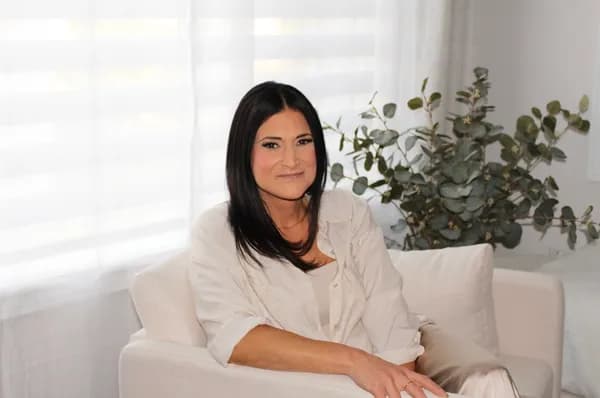Therapy for parenting

You love your kids fiercely, but some days parenting feels impossible. Maybe you are exhausted from constant battles, worried you are repeating your own parents' mistakes, or overwhelmed by the responsibility of raising children. Perhaps your child's behavior is baffling, you and your partner disagree about discipline, or you feel guilty that you are not enjoying parenthood the way you thought you would. You are not failing. Parenting is genuinely hard, and therapy can help you become the parent you want to be while preserving your own wellbeing.
Understanding therapy for parenting
More than parenting advice
Parenting therapy goes deeper than generic tips from books or social media. It is personalized support that considers your specific children, family dynamics, personal history, and what actually works for your unique situation. A therapist helps you understand why certain approaches are not working, identify patterns you are stuck in, process your own emotions about parenting, and develop strategies tailored to your children's ages, temperaments, and needs.
Why parents seek therapy
Parents come to therapy for many reasons. Your child might have challenging behaviors you cannot manage, like persistent tantrums, refusal to follow instructions, aggression toward siblings, or complete shutdown when facing difficulties. Perhaps you and your co-parent constantly disagree about discipline, undermining each other and confusing your children. Some parents struggle with specific developmental stages, while others realize they are repeating their own parents' patterns despite swearing they never would. You might be dealing with your child's mental health issues or special needs, or simply feeling overwhelmed and needing someone to validate that it is okay to struggle.
Parenting in Canada
Sources:Public Health Ontario early years risk indicators andMental Health Research Canada reports.
The impact of parenting stress
Parent wellbeing
Parenting stress profoundly affects your mental health. You might experience anxiety about whether you are doing enough or making irreparable mistakes. Depression can creep in when parenting feels joyless and relentless. Some parents feel they have lost themselves entirely, with the person they were before kids replaced by someone who only manages needs and breaks up fights. Parental burnout is real, characterized by exhaustion, emotional distancing from children, and feeling ineffective as a parent.
Impact on children
When you are overwhelmed, children feel it. They might become more clingy and demanding or withdraw and act out. Harsh or inconsistent discipline driven by your own stress creates anxiety and behavior problems. Children internalize your stress and struggle to learn emotional regulation when you cannot manage your own emotions. Your wellbeing and parenting quality directly shape your children's development, mental health, and future relationships.
Relationship strain
Parenting disagreements can damage partnerships. One parent's permissiveness makes the other stricter, creating polarization. You argue about screen time, bedtime, discipline, and activities. Resentment builds when you feel you are doing everything while your partner seems oblivious. Intimacy disappears under exhaustion and constant conflict. Some relationships do not survive the stress of conflicting parenting styles and unequal mental load.
Loss of identity
Parenthood can feel like losing yourself. Your career takes a backseat. Friendships fade. Hobbies feel indulgent when responsibilities pile up. You exist in service of tiny people who do not appreciate your sacrifices. The isolation is profound, especially for primary caregivers. You might love your children desperately while simultaneously grieving the life and identity you had before. Both feelings can be true, and the guilt about that ambivalence can be crushing.
How therapy supports better parenting
Skills and healing
Parenting therapy is not about blaming you or making you feel worse. It is about giving you tools, insight, and support to handle one of life's hardest jobs. Your therapist helps you understand child development so expectations match reality, teaches concrete behavior management strategies that work, helps you identify and heal your own triggers, improves communication with your co-parent, and validates the incredibly hard work you are doing. You leave sessions with practical strategies and more self-compassion.
Evidence based parenting approaches
Parent Child Interaction Therapy
PCIT is highly effective for young children with behavior problems. Parents learn specific skills through live coaching while interacting with their child. You practice positive attention, effective commands, and consistent consequences while your therapist guides you in real time. This approach strengthens parent child relationships while reducing problem behaviors. It is particularly powerful for children aged 2 to 7 and shows significant improvements in family functioning.
Positive parenting and collaborative problem solving
These approaches move beyond traditional reward and punishment to understanding why children misbehave. Challenging behavior signals unmet needs or lagging skills, not willful defiance. You learn to involve children in solving problems, set limits without harshness, and address underlying causes of behavior. This respectful approach builds cooperation, emotional regulation, and problem solving skills while maintaining appropriate parental authority.
Attachment based parenting
This approach focuses on creating secure attachment between parent and child. You learn to be sensitive and responsive to your child's needs, provide comfort during distress, and serve as a secure base for exploration. Research shows secure attachment predicts better outcomes across all life domains. For parents with their own attachment wounds, this work involves healing your history while building secure bonds with your children.
Emotion coaching and regulation
Children learn emotional regulation from parents who can stay calm during their emotional storms. Emotion coaching teaches you to acknowledge and validate feelings while setting limits on behavior: "You are angry about leaving the park, and we still need to go." You learn to regulate your own emotions first, model healthy coping, and help children develop emotional vocabulary and management skills. This prevents behavior escalation and builds emotional intelligence.
Addressing intergenerational patterns
Many parents unconsciously repeat their own parents' approaches or overcorrect in opposite directions. Therapy helps you examine your parenting inheritance, identify what to keep and what to release, and consciously choose your approach. Healing your own childhood wounds prevents passing them to your children. This deeper work often transforms not just your parenting but your entire sense of self and relationships.
The parenting therapy journey
Understanding your family
Early sessions involve comprehensive exploration of your children, parenting challenges, your own childhood and how it affects you now, your co-parenting relationship, and current stressors. Your therapist wants to understand not just what is going wrong but your strengths, values, and what you are already doing well. Many parents are surprised to learn they are doing more right than they realized. By the end of assessment, you have specific goals and a tailored plan.
Learning and practicing strategies
Middle sessions focus on skill building and practice. Your therapist teaches specific techniques, then helps you plan implementation at home. You might role play difficult scenarios to build confidence before facing real situations. You try new strategies at home, then debrief what happened. Your therapist helps you understand why something worked or did not, make adjustments, and keep going. Gradually you build a toolkit of effective responses and ability to think clearly even during meltdowns.
Addressing your own triggers
As you develop skills, therapy often shifts to deeper work. Why does your child's whining make you so angry? Why do you avoid setting limits? Often these reactions connect to your own childhood experiences. You might need to grieve the parenting you did not receive, process trauma, or heal old wounds before you can parent from a regulated place. This work benefits not just your parenting but all your relationships and personal wellbeing.
Sustaining progress
Parenting therapy typically involves 10 to 20 sessions, though this varies based on complexity. Many parents notice improvements within weeks, with more substantial changes around 8 to 12 sessions as new patterns become habitual. Success does not mean your kids never misbehave or you never lose your temper. It means you have strategies that work most of the time, recover faster from difficult moments, feel more confident in decisions, and enjoy your children more because you are not constantly stressed about managing behavior.
Find a therapist specializing in parenting
Choosing the right therapist matters. Each province in Canada has its own regulations, which is why working with a recognized professional can make a real difference in your care. Stellocare takes the uncertainty out of the process by listing only verified therapists you can trust.
The right therapist for you
No therapists found with these specialties in Ontario.
Try selecting a different province.Resources and support
Canadian parenting support programs
EarlyON Child and Family Centres Ontario
Free programs across Ontario for families with children birth to 6 years. Offers play based learning, parenting support, early childhood education, and connection with other families. Over 750 centres plus 450 additional locations in libraries, schools, and community centres.Find a centre near you.
Parent Support Services Society of BC
Offers free parenting support groups in multiple languages across BC. Provides workshops, community events, and volunteer led circles for parents and caregivers. Includes specialized support for grandparents raising grandchildren and culturally specific programming.Visit website.
Parent Resource Centre Ottawa
Builds confident, resilient families through engaging programs, social services, and supportive resources for children, youth, parents, and caregivers. Offers play based programming, parent education, and family connection activities in a welcoming environment.Visit website.
Families Matter Calgary
Strengthens families through learning opportunities that build confidence, competence, and connection through life's transitions. Promotes optimal child development by empowering families to be resilient and foster positive relationships. Offers various family programs and father involvement initiatives.Visit website.
Public Health Agency of Canada Parenting Resources
National resource hub providing information on child safety, injury prevention, positive parenting practices, and culturally responsive parenting. Includes resources for separation and divorce, Indigenous communities, and various family structures.Access resources.
Practical parenting strategies
Effective behavior management
- Prevention over reaction: Most challenging behaviors can be prevented. Ensure basic needs are met (hungry or tired kids cannot cooperate), give warnings before transitions, offer acceptable choices, and create predictable routines. When children know what to expect and feel some control, behavior problems decrease dramatically.
- Clear, kind limits: Children need limits to feel safe. State them clearly and positively: "We use gentle hands" instead of "Don't hit." Give reasons children can understand. Follow through consistently, but maintain warmth: "I know you want to keep playing. And it is bedtime now."
- Natural and logical consequences: Effective consequences are related to the behavior and help children learn, not just punish. Natural consequences happen automatically; logical consequences are imposed but related. They should match severity and happen soon enough that children connect them to the behavior.
Building emotional connection
- Your regulation comes first: You cannot calm your child when you are dysregulated. Before addressing behavior, take a breath. Model emotional regulation: "Mom is feeling frustrated and needs to take some deep breaths." Your children learn regulation by experiencing you staying calm during their storms.
- Validate feelings, limit behavior: All feelings are okay; not all behaviors are. Validate emotions even when stopping actions: "You are really angry that we have to leave, and we still need to go now." This validation helps children feel understood and often de-escalates situations faster than logic.
- Special time and rituals: Children who feel connected behave better. Schedule regular one on one time with each child, even 10 to 15 minutes daily. Let them choose the activity, put away your phone, and be fully present. Create connection rituals like special handshakes or bedtime routines.
- Repair after mistakes: You will yell. You will overreact. This is normal. What matters is repair. Apologize sincerely: "I should not have yelled. I was frustrated, but that was not okay." Children learn more from watching you repair mistakes than from you being perfect.
Self care for parents
- Self care is not optional: You cannot pour from an empty cup. Taking care of yourself is not selfish; it is necessary for sustainable parenting. This means adequate sleep when possible, eating properly, asking for help, taking breaks, maintaining some adult friendships, and protecting personal time. Your wellbeing directly affects your children's wellbeing.
- Lower the bar: Perfect parenting does not exist. Good enough parenting is actually good enough. Your children need you to be present and responsive most of the time, not perfect all the time. Lower your standards for household perfection and raise your standards for rest and connection.
- Build your village: Parenting alone is not sustainable. Actively build support systems: other parents, family members, childcare providers, community programs. Many parents need permission to ask for help. Here it is: asking for help is wise, not weak.
Books: "The Whole-Brain Child" by Dr. Daniel Siegel, "How to Talk So Kids Will Listen" by Adele Faber, "No-Drama Discipline" by Dr. Daniel Siegel, "Peaceful Parent, Happy Kids" by Dr. Laura Markham, "The Explosive Child" by Dr. Ross Greene. Podcasts: Good Inside with Dr. Becky Kennedy, Unruffled by Janet Lansbury, The Mindful Mama. Apps: Positive Discipline, Circle of Security Parenting, Moshi (kids' meditation and sleep).
Questions about parenting therapy
Will my child need to attend sessions?
This depends on your child's age and the issues you are addressing. For young children, therapy usually focuses on teaching you strategies, so your child might not attend or only occasionally. For school age children and adolescents, involving them in some sessions can be valuable. Your therapist will recommend what makes sense. Many parents benefit greatly from sessions just for themselves.
What if my co-parent will not participate?
One parent making changes can still significantly improve family dynamics. Your therapist can help you implement strategies even without your partner's participation. Sometimes reluctant partners join later after seeing positive changes. If co-parent conflict is severe, your therapist might focus on helping you navigate disagreements and maintain consistency despite different approaches.
Is it normal to sometimes dislike my child or regret having kids?
Yes, though most parents feel guilty admitting this. Loving your children and sometimes resenting them are not mutually exclusive. Parenting is hard, often thankless work. Acknowledging difficult feelings does not make you a bad parent; it makes you honest. Therapy provides safe space to voice these feelings without judgment and helps you work through them.
What if I am parenting exactly like my parents and I hated how they raised me?
This realization is common and painful but also hopeful. You cannot change what you do not recognize. Many parents unconsciously repeat their parents' approaches despite wanting to be different. Therapy helps you understand these patterns, process your own childhood experiences, and consciously choose different approaches. Breaking generational cycles is hard work but incredibly valuable.
How do I know if my child's behavior is normal or something more serious?
This is exactly what a therapist can help assess. They understand developmental norms and can identify when behaviors exceed typical challenging phases. Red flags include behaviors that are extreme in intensity or duration, significantly impact functioning, or involve hurting themselves or others. When in doubt, consult a professional. Early intervention is more effective than waiting.
Can therapy help with divorce or blended families?
Absolutely. Therapists can provide specialized support for co-parenting after separation, helping children adjust to divorce, navigating stepfamily dynamics, or supporting children through major transitions. These situations have unique challenges, and therapists experienced in these areas offer invaluable guidance for minimizing harm and promoting resilience.
Related concerns
References
- Mikolajczak, M., Gross, J. J., & Roskam, I. (2019). Parental burnout: What is it, and why does it matter? Clinical Psychological Science, 7(6), 1319-1329. Retrieved from https://psycnet.apa.org/record/2019-69444-011
- Thomas, R., & Zimmer-Gembeck, M. J. (2007). Behavioral outcomes of Parent-Child Interaction Therapy and Triple P—Positive Parenting Program: A review and meta-analysis. Journal of Abnormal Child Psychology, 35(3), 475-495. Retrieved from https://pubmed.ncbi.nlm.nih.gov/17333363/
- Groh, A. M., et al. (2014). The significance of attachment security for children's social competence with peers: A meta-analytic study. Attachment & Human Development, 16(2), 103-136. Retrieved from https://pmc.ncbi.nlm.nih.gov/articles/PMC4021853/
- Government of Ontario. (2025). Find an EarlyON Child and Family Centre. Retrieved from https://www.ontario.ca/page/find-earlyon-child-and-family-centre
- Parent Support Services Society of BC. (2025). Home. Retrieved from https://parentsupportbc.ca/
- Parent Resource Centre. (2025). Home. Retrieved from https://www.parentresource.ca/
- Public Health Agency of Canada. (2025). Parenting Resources and Support. Retrieved from https://www.canada.ca/en/public-health/services/health-promotion/childhood-adolescence/parent/parenting-resources-support.html
- Families Matter. (2025). Home. Retrieved from https://familiesmatter.ca/
About Stellocare
Stellocare is a Canadian platform where you can find the best fit therapist for you. Search the right thperaists now by asking our AI, browsing our list, or finding our social workers for personal referral.

Maya Dousti
Registered Psychotherapist (ON)

Karen Weishuhn
Registered Psychotherapist (Qualifying) (ON)

Carissa Cochrane
Canadian Certified Counsellor

Lesley Baker
Licensed Counselling Therapist (NB)

Marla Soubhie
Registered Psychotherapist (Qualifying) (ON)

Caitlin Pelkey
Registered Psychotherapist (Qualifying) (ON)

Rachel Tolkin
Registered Psychotherapist (Qualifying) (ON)

Cassandra Valmestad
Canadian Certified Counsellor

Supriya Verma
Registered Psychotherapist (Qualifying) (ON)

Hazim Al-faouri
Canadian Certified Counsellor

Joe-Ann Watkins
Registered Psychotherapist (Qualifying) (ON)

Chanté Merriman
Registered Psychotherapist (Qualifying) (ON)

Jay Hinton
Canadian Certified Counsellor

Jessica DeMille
Registered Psychotherapist (Qualifying) (ON)

Katharine Heimbigner-Tenor
Registered Provisional Psychologist (AB)

Nicole Pawlick
Canadian Certified Counsellor

Florence Wong
Registered Social Worker (BC)

Joanne Prysunka
Canadian Certified Counsellor

Jinny Hong
Registered Psychologist (ON)

Maya Dousti
Registered Psychotherapist (ON)

Karen Weishuhn
Registered Psychotherapist (Qualifying) (ON)

Carissa Cochrane
Canadian Certified Counsellor

Lesley Baker
Licensed Counselling Therapist (NB)

Marla Soubhie
Registered Psychotherapist (Qualifying) (ON)

Caitlin Pelkey
Registered Psychotherapist (Qualifying) (ON)

Rachel Tolkin
Registered Psychotherapist (Qualifying) (ON)

Cassandra Valmestad
Canadian Certified Counsellor

Supriya Verma
Registered Psychotherapist (Qualifying) (ON)

Hazim Al-faouri
Canadian Certified Counsellor

Joe-Ann Watkins
Registered Psychotherapist (Qualifying) (ON)

Chanté Merriman
Registered Psychotherapist (Qualifying) (ON)

Jay Hinton
Canadian Certified Counsellor

Jessica DeMille
Registered Psychotherapist (Qualifying) (ON)

Katharine Heimbigner-Tenor
Registered Provisional Psychologist (AB)

Nicole Pawlick
Canadian Certified Counsellor

Florence Wong
Registered Social Worker (BC)

Joanne Prysunka
Canadian Certified Counsellor

Jinny Hong
Registered Psychologist (ON)

